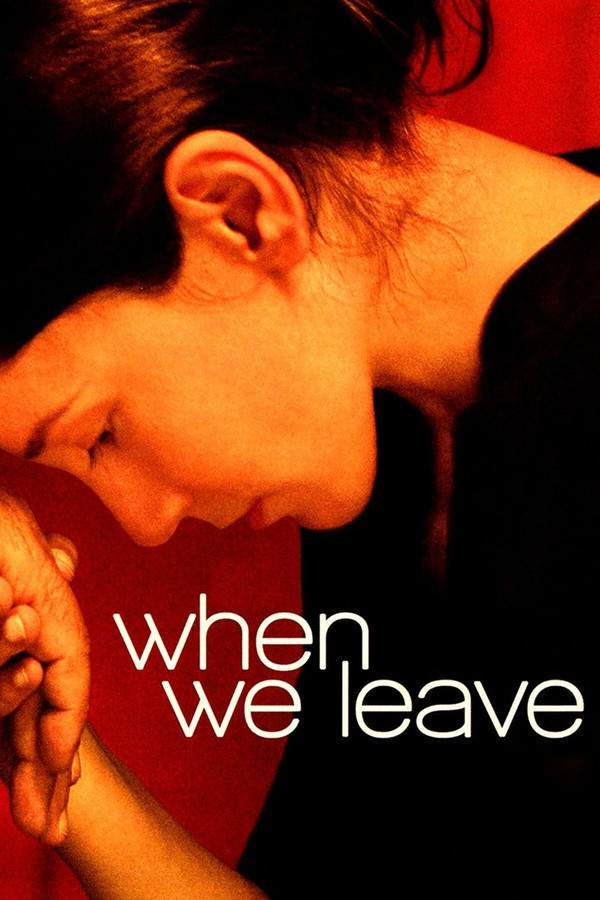When We Leave 2011

Fleeing an arranged marriage in Istanbul, German-born Umay travels to Berlin with her young son, Cem, hoping for a fresh start with her family. Her arrival, however, ignites conflict as deeply held traditions collide with modern desires. Struggling to balance her own aspirations and her son's well-being, Umay’s determination to reconcile with her past leads to painful and unexpected consequences, forcing her to confront the true cost of freedom.
Does When We Leave have end credit scenes?
No!
When We Leave does not have end credit scenes. You can leave when the credits roll.
Meet the Full Cast and Actors of When We Leave
Explore the complete cast of When We Leave, including both lead and supporting actors. Learn who plays each character, discover their past roles and achievements, and find out what makes this ensemble cast stand out in the world of film and television.
No actors found
External Links and Streaming Options
Discover where to watch When We Leave online, including streaming platforms, rental options, and official sources. Compare reviews, ratings, and in-depth movie information across sites like TMDb, Wikipedia, Rotten Tomatoes or Metacritic.
Ratings and Reviews for When We Leave
See how When We Leave is rated across major platforms like IMDb, Metacritic, and TMDb. Compare audience scores and critic reviews to understand where When We Leave stands among top-rated movies in its genre.

65
Metascore
5.9
User Score


72%
TOMATOMETER

80%
User Score

69
%
User Score

3.8
From 2.6K fan ratings
Take the Ultimate When We Leave Movie Quiz
Challenge your knowledge of When We Leave with this fun and interactive movie quiz. Test yourself on key plot points, iconic characters, hidden details, and memorable moments to see how well you really know the film.
When We Leave Quiz: Test your knowledge about the poignant drama 'When We Leave', focusing on Umay's struggle for independence and family dynamics.
What city does Umay return to in search of independence?
Istanbul
Berlin
Ankara
London
Show hint
Full Plot Summary and Ending Explained for When We Leave
Read the complete plot summary of When We Leave, including all major events, twists, and the full ending explained in detail. Explore key characters, themes, hidden meanings, and everything you need to understand the story from beginning to end.
Umay, portrayed by Sibel Kekilli, finds herself trapped in a suffocating life in the suburbs of Istanbul with her abusive husband Kemal, played by Ufuk Bayraktar, and their young son Cem, represented by Nizam Schiller. Haunted by her memories of home in Berlin, Umay reaches a breaking point: she gathers her belongings and resolves to leave her troubled marriage behind.
With hope in her heart, she returns to her childhood home in Berlin, dreaming of a fresh start and longing for her family’s support. However, her aspirations are swiftly crushed when her father Kader, played by Setter Tanröigen, learns of her defiance. Insisting that she must return to her husband as per tradition, Kader orders her back. In a moment of desperation, Umay declares her autonomy by burning her passport, leading to tension within the family. Her mother warns her harshly, “Stop dreaming!” as her siblings face the community’s disdain due to Umay’s choices.
As the struggle intensifies, Umay’s older brother, Mehmet (Tamer Yigit), and father conspire to kidnap her son Cem, intending to restore the family’s honor by returning him to Kemal. Fearing for her child’s safety, Umay escapes to a women’s shelter, embarking on a brave new chapter of resilience. In this sanctuary, she finds solace and strength, and through her work in the kitchen, she meets Stipe, played by Florian Lukas, a colleague who ignites a spark of hope and companionship.
As time progresses, Umay begins to establish her independence; she secures her own apartment and carves out a fulfilling life away from her oppressive past. Yet, a deep sense of longing for her family lingers. Time and again, she attempts to reach out to her mother and younger brother, Acar (Serhad Can), but her efforts are met with silence and rejection. Meanwhile, her brothers and father grapple with a harrowing decision: Acar is faced with the grim task of restoring their family’s honor through the ultimate betrayal—killing his beloved sister.
In this gripping tale of sacrifice, resilience, and the quest for freedom, Umay’s journey reveals the complexities of familial bonds and the harsh realities facing women seeking autonomy within a rigid societal framework.
Uncover the Details: Timeline, Characters, Themes, and Beyond!

Coming soon on iOS and Android
The Plot Explained Mobile App
From blockbusters to hidden gems — dive into movie stories anytime, anywhere. Save your favorites, discover plots faster, and never miss a twist again.
Sign up to be the first to know when we launch. Your email stays private — always.
Watch Trailers, Clips & Behind-the-Scenes for When We Leave
Watch official trailers, exclusive clips, cast interviews, and behind-the-scenes footage from When We Leave. Dive deeper into the making of the film, its standout moments, and key production insights.
When We Leave Other Names and Titles
Explore the various alternative titles, translations, and other names used for When We Leave across different regions and languages. Understand how the film is marketed and recognized worldwide.
Quick Links: Summary, Cast, Ratings, More

What's After the Movie?
Not sure whether to stay after the credits? Find out!
Explore Our Movie Platform
New Movie Releases (2025)
Famous Movie Actors
Top Film Production Studios
Movie Plot Summaries & Endings
Major Movie Awards & Winners
Best Concert Films & Music Documentaries
Movie Collections and Curated Lists
© 2025 What's After the Movie. All rights reserved.














